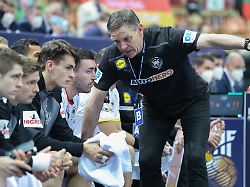Curious speech as a signal
The national handball coach and “all this shit”
By Till Erdenberger, Katowice
01/21/2023 4:23 p.m
The German national handball team started the intermediate round of the World Cup with a thumping victory – and inspired the national coach so much that a curious and meaningful speech was made. It would be great if Alfred Gislason could repeat these.
The German national handball team presented itself extremely successfully at the world championships in Poland and Sweden. In attack, the DHB professionals produce goals on the assembly line – thanks to a great efficiency that has been badly missed in recent years. In the first main round game against Argentina, five million TV viewers on ARD will witness what the course of the tournament has already triggered: “Everything’s fine, no problem, play what you want here, outside, back, all that shit,” said Gislason called on a time-out midway through the second half to his side, who were already bagging their fourth win in four games.
An unleashed half-time against completely overwhelmed Argentines was enough for the meticulous national coach to relax early and change his offensive properly. And just gave his team a blank check for the rest of the game.
“I tried to activate the boys’ minds, I don’t have that many breaks. The boys are doing great at the moment, they communicate very, very well with each other,” explained the 63-year-old afterwards. “That’s why I told them a thing or two, like how to build things up, but otherwise they could do whatever they want if they make the right decisions.” He can also hope for the same in the evening against the Netherlands (8.30 p.m. / ZDF and in the live ticker on ntv.de): With a win, his team has a place in the knockout round.
“An excellent solution to every task”
A break as a symbol for the internal relationship between the coach and the team: the mutual trust is great. Almost huge. “That’s maybe a small compliment and a confirmation of what we did before and also a sign of trust,” said playmaker Juri Knorr later. His colleagues, led in the second half by Knorr’s deputy Luca Witzke, had brought the game to a serious end – and justified the confidence of the national coach: The Icelander praised his team for “an incredibly concentrated performance by the team”.
39:19 was the score at the end of a completely one-sided game. “Alfred is of course also very emotional, but still manages to bridge the gap between before and after the game,” said goalkeeper Andreas Wolff in praise of his coach. “Despite his tension, he manages to give us a certain calm before the game because he has an incredible amount of experience and an incredible amount of sovereignty.”
In the days of Katowice something grows under competitive conditions and the national coach has seen for four games how seriously and with what clear focus his team tackles the tasks. Even if, with the exception of Serbia, the previous opponents do not meet the high international standards: even easy tasks are difficult to solve. “What is very important to say: The team has solved every task excellently. You can hardly do it better,” said former DHB Vice President Bob Hanning enthusiastically in an interview with ntv.de. “In this way, it was always possible to dose deployment times early and save energy. That makes me very confident.”
Mutual trust grows with self-confidence. Gislason had seen his team make “many expensive mistakes” in the last preparatory games and was very annoyed about it. Against Argentina, his players scored 24 goals from their first 26 attacks. Before the start of the tournament, the coach and team had formulated the work order “in the phases in which we get out of step, to keep calm, to have a plan of how we want to act and to keep calm”, as captain Johannes Golla put it.
It’s been working great so far: an offensive with tremendous penetration and an almost endless repertoire of good solutions doesn’t even go through phases of weakness, Gislason was able to spare himself early on against Argentina, as he did before in the 37:21 against Algeria, and with his players in the merciless tournament rhythm save important energy.
“Great trust in each individual”
But the big pressure situations are only now coming. Against the Netherlands, who are doing well in Poland, it is already about the quarterfinals, in the last main round game the first team of absolute world class format is waiting for the DHB team with secret favorite Norway. And then the first knockout game at a World Cup or European Championship for four years. Then the pulse of the national coach should rise again.
“Our strength at the moment is that we play freely in attack. We have built up self-confidence in the last few weeks. This must now also be implemented in the coming pressure situations. But I have a lot of trust in everyone,” enthused Golla recently. Alfred Gislason has not yet achieved anything countable with his team in Poland.
But trust in your own ideas is a value in itself. “You build success. And success brings security. You see that what you have worked for works,” said Bob Hanning, one of the architects of the sensational German EM triumph in 2016 Develop systems without exhausting yourself.” All that shit, it works.
